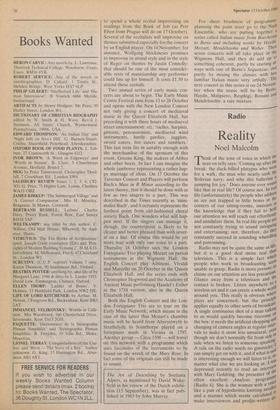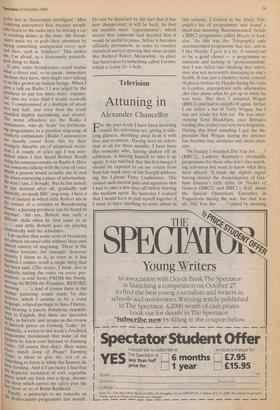Radio
Reality
Noel Malcolm
rr hink of the tone of voice in which the
man on telly says: 'Coming up after the break: the duck-billed platypus who Weill for a walk; the man who nearly sank th.e Bolivian navy; and why this ballerina Is, jumping for joy.' Does anyone ever soon° like that in real life? Of course not. In real life (unfortunately) the people who address us are not trapped in little boxes in the corners of our sitting-rooms, insecure the knowledge that if they fail to h°I,!', our attention we will reach out effortlesslY and annihilate them. In real life people not constantly trying to sound intrigunt and entertaining; nor, therefore, do the constantly succeed in sounding wheedlthg and patronising. Radio may not be quite the same as life' but it is a good deal more real th.abri television. This is a simple fact whi' people who work in broadcasting see.".„ unable to grasp. Radio is more present; I" claims on our attention are less precarious' Glance away from a television and the contact is broken. Listen anywhere to cal wireless set and it can create a whole Wori, around you. This really is obvious wher,; plays are concerned; but the prince" applies equally to other sorts of broadcast. A single continuous shot of a man talking to us would quickly become tiresome °dr/ the box: it needs the artificial chopping all, changing of camera angles at regular int% vals to make it seem less unnatural. Oleo though we don't normally flit from side. 'cr side when we listen to someone speak11 A talk on the radio needs no gimmicks;.'d can simply get on with it, and if what is sal° is interesting enough we will listen to it,ris matter what else we are looking at. I 11. aoi depressed recently to read an inter'ie with Mary Goldring, the presenter of the often excellent Analysis program.rie (Radio 4). She is the woman with a voles like a pair of hypodermic knitting needlo and a manner which seems calculated L make interviewers and profile-writers e' scribe her as 'fearsomely intelligent'. Miss Goldring announced that because people Who listen to the radio may be driving a car or washing dishes at the time, the broad- caster must try to grab their attention by saying something unexpected every now and then, such as 'knickers'. This strikes flue, I'm afraid, as a fearsomely unintelli- gent thing to think. If only radio broadcasters could realise What a direct and, so to speak, immediate Medium they have, they might start talking to us like grown-up human beings. When I gave a talk on,Radio 3 I was urged by the producer to put ten times more 'express- ion' into my voice than I would normally nse. I compromised at a multiple of about two and half, and even then the result sounded slightly patronising and absurd. The worst offenders are the Radio 4 announcers, who do 'trails' for forthcom- ing programmes in a peculiar sing-song of synthetic enthusiasm. (Radio 3 announcers are usually saved from this by their strangely likeable air of perpetual wean- ness.) A couple of years ago I was asto- nished when I first heard Robert Booth doing his announcements on Radio 4. Here Was someone talking with the tone of voice Which a person would actually use in real fe when conveying a piece of information. re won't last, I thought. But he has lasted: ne. has learned after all, gradually and Painfully, to speak BBC sing-song. I have a +8,°11 of fantasy in which little Robert sits in ,,ine corner of a corridor in Broadcasting `louse; a passing producer can be heard to ni.urmur: `Ah yes, Robert was such a difficult child when he first came to us • '; and little Robert goes on playing contentedly with his schedules. I do realise that some sorts of broadcast 41-e almost inconceivable without their own 'Pecial variety of sing-song. There is the weather forecast, for example: however I,ntently I listen to it, as soon as it has Pished I cannot recall a single thing that 'as been said. (The secret, I think, lies in suddenly raising the voice on every pre- Position: 'a cold front, FROM the North, _11)°ving ACROSS the Pennines, BEFORE glorning . . .'.) And of course there is the trange pattering sound made by disc 1.nekeys, which I assume to be a tonal .anguage, related perhaps to Sino-Tibetan, "'id bearing a purely fortuitous resembl- ie to English. But these are specialist „Icelds, as hieratic and arcane as the review fatstock prices on Farming Today. In- "dentally, a writer to last week's Feedback rOgramme mentioned that none of the i,iriners he knew ever listened to Farming vPday. Of course they don't. How many ;cars watch Song of Praise? Farming ,°daY is there to give the rest of us ,l'a.ething to listen to while the farmers do `jleir farming. And if I am lucky I find that ne hypnotic recitation of root vegetable 1)riees sends me back into a deep, dream- fess sleep which carries me safely past the ktst hour or so of Brian Redhead. Pinally, a postscript to my remarks on 'le Rollercoaster programme last month.
Do not be deceived by the fact that it has now disappeared: it will be back. Its first six months were 'experimental', which means that someone had decided that it would be useful to pause, before it becomes officially permanent, in order to conduct statistical surveys proving that most people like Richard Baker. Meanwhile, its place has been taken by something called Lacuna, which is Latin for a hole.























































 Previous page
Previous page